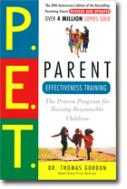
Dr. Thomas Gordon's Parent Effectiveness Training is the classic text on improving your own communication skills so that the person you are talking to feels heard and respected. The August selection of the Tuesday Book Club is as helpful to parents and children today as it was back in 1970 when the first edition was released. Here are the links to listen to the past three teleconference discussions in case you missed them.
Tuesday Book Club 7/27/10
Tuesday Book Club 8/3/10
Tuesday Book Club 8/10/10
In a subsequent publication (P.E.T. in Action- Children must be respected as individual persons, not as a different species or anomalies in time.
- How the child behaves is largely determined by what goes on in the parent-child relationship.
- There are fundamental principles about interpersonal relationships that must be understood. The two primary principles are: all humans are inconsistent in what behaviors they find acceptable in another (it is okay for parents to be inconsistent); and the principle of problem ownership (who owns a problem determines the strategy one must use to successfully communicate at that point in time).
- four basic listening skills that communicate messages like "I won't take your problem away from you and I am here to help you find your solution"; "I have faith that you have all the ability you need to handle your problem constructively"; and "I love you for who you are and problems are a normal part of life."
- how to talk so that kids will listen
- how to change behavior by modifying the environment
- win-win conflict resolution which is helpful when a behavior is impacting both people in the relationship
If you are out of town, join via teleconference at 7:00 PM CDT on 8/17/10 at (512) 501-4531 and code 121014#.
Your comments and questions are welcome here as another avenue for book discussion and personal growth. Until next time, remember one idea is all it takes to change your world. Have you already fallen in love with an idea and are having trouble getting back up when someone or something knocks you down? Find your tribe and mastermind with them.
In friendship,
Lori L. Barr, M. D.
Vice President, MindTamers
Reference:
P.E.T. in Action


